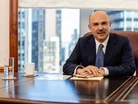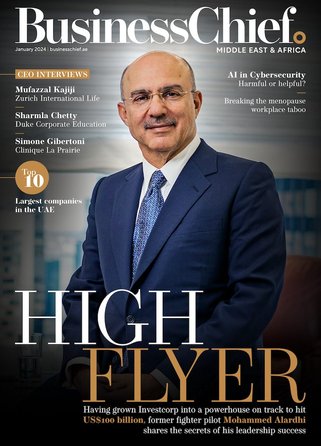Interview: Mohammed Alardhi, Investcorp Executive Chairman

From fighter pilot to fashion house financier, Mohammed Alardhi has followed a path less travelled to becoming Executive Chairman of US$50 billion global investor Investcorp.
Once the youngest and longest serving Commander of Oman’s Royal Air Force with zero experience of running a hedge fund or private equity firm, Alardhi has propelled Bahrain-headquartered Investcorp from a US$10 billion alternative asset management firm to one looking towards US$100 billion.
Now he is sharing the secrets of his success via new book Connecting To The Future where he combines business chops from a Master’s at Harvard with what he calls ‘cockpit culture’.
“The popular assumption is that both flying and investing satisfy an appetite for risk. I don’t think that’s quite right,” says Alardhi. “I think they require fortitude in the face of risk. The secret to survival and success is acknowledging the full range of risks and calculating how to mitigate them long before you push the throttle forward or sign off on an action plan.
“And then there’s the excitement, the sense of accomplishment and, yes, the wonder, whether I’m in a cockpit or ‘flying a desk’ at Investcorp.”
Alardhi retired after 25 years in the Royal Air Force of Oman with the rank of Air Vice Marshal, and was awarded the Order of Oman – the country’s highest honour – by the late Sultan Qaboos bin Said Al-Said.
Taking the helm of a struggling Investcorp, with a portfolio including luxury brands such as Tiffany and Gucci could not have been further from that military world.
However, Alardhi used his leadership experience to transform Investcorp from a US$10 billion assets under management business to beyond US$25 billion within two years.
Founded in Bahrain in 1982 as a pioneer in private equity, acting as a bridge between the Gulf and the rest of the world, Investcorp has grown to be a global investment manager, with 14 offices worldwide, from the US to UAE, India to China, and managing U$50 billion in assets.
Investcorp specialises in alternative investments across private equity, real estate, credit, absolute return strategies, GP stakes, infrastructure, and insurance asset management.
“We’re no longer the boutique investment firm we were when I became Executive Chairman in 2015,” says Alardhi. “Our assets under management (AUM) have quintupled and we now have offices in nine countries offering a full range of investment opportunities. We have transformed ourselves as individuals and as a firm.”
That transformation was essential, he says, identifying Investcorp’s hurdles as stagnation and silos.
“The 2008 financial crisis and the 2009-2010 Eurozone debt debacle had put the firm on the ropes. While it had mostly recovered to US$9 billion AUM, the experience had scarred people and made them overly cautious,” says Alardhi.
“The firm hadn’t grown in seven years. People lacked the confidence and courage to challenge the status quo. My concern was the mentality that protecting the status quo had created. Stagnation spawns silos, and silos in turn reinforce stagnation.
“When people are trapped in silos, they look inward, rather than outward. They don’t share information and ideas across administrative lines. They can’t benefit from the knowledge others have amassed. They don’t have a sense of what the company as a whole stands for, let alone how their work aligns with the company’s greater goals. They can’t see the big picture.”
Painting that big picture would be Alardhi’s mission, as it is for any successful leader. What made his approach more impressive was the fact that he was new to the investment world.
So what is his secret?
“If you want people to think bigger, they need to feel comfortable making mistakes,” he says. “Otherwise, they will wait for you to think for them. That’s the worst outcome for everyone.
“We need to set people up for success. It’s the leader’s responsibility to keep an eye on how people develop and to give them the flexibility and opportunity to move, both vertically and horizontally.
“A very important caveat is that when someone messes up, it’s crucial to understand the reasons. Was it something within their control or did external factors influence the outcome? Of course, mistakes are inevitable. That’s how we learn, as individuals and as an institution. We just try not to make the same mistake twice.”
Change is never easy, and encouraging this embracing, accepting culture is easier said than done. Alardhi followed a six-step plan at Investcorp – shock people into understanding the need for change; question the status quo; push people to think bigger; create a comfortable forum to share ideas; don’t penalise risk-taking; and make everyone an owner.
“If you visit any Investcorp location, you’re likely to spot a framed poster depicting the intricately decorated doors of Oman,” he says. “The posters express my pride in my home country but they also send a message: I want to remind people that our business is about opening doors to new opportunities. The posters ask, Which doors will you choose to open and which will you have the courage to walk through?
“I wanted people to be inspired by the possibility of exceeding their own expectations. I wanted them to believe that, by working together, we could reach that goal.”
As a fighter pilot, one of the most important skills is situational awareness. This is something every fighter pilot learns early on – how to closely observe your surroundings, pick up cues and analyse how decisions could impact the present and future. Think of it as risk management in the dimensions of time and space.
“Sharpening your situational awareness can help leaders identify blind spots and pick up potential danger signals early on,” says Alardhi. “I encourage curiosity and welcome diversity of opinion. I regularly invite a wide range of outside experts — not just ‘the usual suspects’ — to share their thoughts about global political and economic developments that might affect the business, in both small forums and company-wide town halls.”
He cites the example of the COVID-19 pandemic, adding that Investcorp learned about the potential impact two months before the World Health Organization declared a global health emergency.
Alardhi admits that this unprecedented shutdown made Investcorp re-examine its priorities as a firm.
“To be sure, we’re still focused on making a profit, but the human factor takes priority — always,” he states adamantly. “We want to ensure that our people feel safe and supported. As I said at one of our town halls, ‘Listen, we all have our difficult moments. It’s okay to not always be okay.’
“While we couldn’t predict the severity of an economic crash, we could take precautions,” he adds “Equally important, we prepared ourselves mentally through scenario planning. COVID was like falling off a cliff but at Investcorp, we had a parachute.”
That is one essential backup that any fighter pilot will endorse, and certainly one that business leaders should embrace.
- Interview: Mufazzal Kajiji, CEO of Zurich International LifeLeadership & Strategy
- Why executive education is more important than everLeadership & Strategy
- New Sasol CEO to drive South African firm’s emissions planSustainability
- Mira Murati: 10 things to know about the new CEO of OpenAILeadership & Strategy
Featured Interviews
Inge Huijbrechts, Global SVP Sustainability, Security & Corporate Communications at Radisson Hotel Group, discusses the business’s sustainability journey
Prashant Gulati is driving Faraday Future to pole-position in the luxury electric car industry as they prepare to launch the FF 91
“We are building what we believe is the most connected, most comfortable, most technologically-advanced electric car in the world: we call it the FF 91”
Mansour Al Blooshi, Head of Procurement at Abu Dhabi’s Mohamed bin Zayed University of Artificial Intelligence (MBZUAI), on delivering AI’s future talent
Inge Huijbrechts, Global SVP Sustainability, Security & Corporate Communications at Radisson Hotel Group, discusses the business’s sustainability journey





